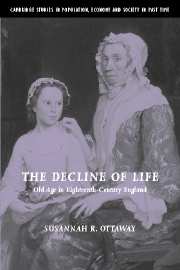Book contents
- Frontmatter
- Contents
- List of figures
- List of tables
- Acknowledgments
- List of abbreviations
- Introduction: Old age in eighteenth-century England: no “golden age of aging”
- 1 Who was “old” in eighteenth-century England?
- 2 The activities of the “helmsman”: self-reliance, work, and community expectations of the elderly
- 3 “The comforts of a private fire-side”
- 4 Independent but not alone: family ties for the elderly
- 5 Community assistance to the aged under the Old Poor Law
- 6 Continuity and change in community assistance to the elderly over the eighteenth century
- 7 Within workhouse walls: indoor relief for the elderly
- Conclusion: Old age as a useful category of historical analysis
- Bibliography
- Index
5 - Community assistance to the aged under the Old Poor Law
Published online by Cambridge University Press: 15 December 2009
- Frontmatter
- Contents
- List of figures
- List of tables
- Acknowledgments
- List of abbreviations
- Introduction: Old age in eighteenth-century England: no “golden age of aging”
- 1 Who was “old” in eighteenth-century England?
- 2 The activities of the “helmsman”: self-reliance, work, and community expectations of the elderly
- 3 “The comforts of a private fire-side”
- 4 Independent but not alone: family ties for the elderly
- 5 Community assistance to the aged under the Old Poor Law
- 6 Continuity and change in community assistance to the elderly over the eighteenth century
- 7 Within workhouse walls: indoor relief for the elderly
- Conclusion: Old age as a useful category of historical analysis
- Bibliography
- Index
Summary
The occupation of the labourer, as well as the nature of his being, subjects him to acute illness, chronic disorders, and at length to old age, decrepitude and impotence … without the aid of his more opulent neighbours, or, what is infinitely to the credit of this nation, without the interference of the godlike laws of his country, this useful class of our countrymen would sink in the arms of famine or despair.
The basis of formal economic assistance to the elderly in the eighteenth century was created in 1597/8 and 1601 when the tenets of the Old Poor Law were set by the acts of 39 and 43 Elizabeth. These acts, “the godlike laws” applauded by Thomas Ruggles in the quotation above, stipulated that churchwardens and overseers in every parish in the realm should use taxes raised on the parish's inhabitants to care for the poor. As a guide to parish officers explained: “The stat. of Elizabeth distinguishes the poor into two classes, the able-bodied, or those who are able to work, and the impotent; and it directs the manner in which they are to be provided for, namely by setting the former to work, and by furnishing the latter with necessary relief.” The impotent, the guide continued, were “the aged and decrepit, the fatherless and motherless, the lame, the blind, persons labouring under sickness, idiots, lunatics & c.”
- Type
- Chapter
- Information
- The Decline of LifeOld Age in Eighteenth-Century England, pp. 173 - 220Publisher: Cambridge University PressPrint publication year: 2004



